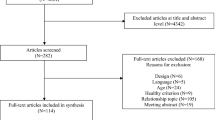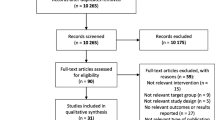Abstract
Routines are an important feature of family life and functioning in families with young children. Common daily routines such as dinnertime, bedtime, and waking activities are powerful organizers of family behavior and may be instrumental to children and families during times of transition, such as elementary school entry. Daily routines were examined in 132 families with children entering kindergarten. Although the majority of families reported regular daily routines for their children, parents anticipated that their child’s daily routines would substantially shift upon kindergarten entry, including changes in children’s sleep habits. Significant changes in child and family routines have been implicated in adjustment difficulties during kindergarten transition. Results of this investigation are discussed in terms of aligning family daily routines with kindergarten expectations. Furthermore, educational professionals in early childhood education and elementary school can partner with families to promote seamless kindergarten transitions for all children.
Similar content being viewed by others
References
Bates, J., Viken, R., Alexander, D., Beyers, J., & Stockton, L. (2002). Sleep and adjustment in preschool children: Sleep diary reports by mothers relate to behavior reports by teachers. Child Development, 73(1), 62–74.
Bradley, R., Corwyn, R., McAdoo, H., & Coll, C. (2001). The home environments of children in the United States, Part I: Variations by age, ethnicity, and poverty status. Child Development, 72, 1844–1867.
Brody, G., & Flor, D. (1997). Maternal psychological functioning, family processes, and child adjustment in rural, single-parent, African American families. Developmental Psychology, 33, 1000–1011.
Eckert, T. L., McIntyre, L. L., DiGennaro, F. D., Arbolino, L. A., Perry, L. J., & Begeny, J. C. (in press). Researching the transition to kindergarten for typically developing children: A literature review of current processes, practices, and programs. In F. C. Columbus (Ed.), School psychology: 21st century issues and challenges. Hauppauge, NY: Nova Sciences.
Fiese, B. (2006). Family routines and rituals. New Haven: Yale University Press.
Fiese, B., Tomcho, T., Douglas, M., Josephs, K., Poltrock, S., & Baker, T. (2002). A review of 50 years of research on naturally occurring family routines and rituals: Cause for celebration? Journal of Family Psychology, 16, 381–390.
Hamre, B. K., & Pianta, R. C. (2001). Early teacher-child relationships and the trajectory of children’s school outcomes through eighth grade. Child Development, 72, 625–638.
Keltner, B. (1990). Family characteristics of preschool social competence among Black children in a Head Start program. Child Psychiatry and Human Development, 21, 95–108.
McIntyre, L. L., Eckert, T. L., Fiese, B. H., DiGennaro, F. D., & Wildenger, L. K. (2007). The transition to kindergarten: Family experiences and involvement. Early Childhood Education Journal, 35, 83–88.
National Sleep Foundation (2007). Children and sleep. Retrieved on 6 July 2007 from http://www.sleepfoundation.org/.
Pianta, R., & Kraft-Sayre, M. (2003). Successful kindergarten transition. Baltimore: Paul H. Brookes Publishing Co.
Quas, J., Murowchick, E., Bensadoun, J., & Boyce, W. (2002). Predictors of children’s cortisol activation during the transition to kindergarten. Developmental and Behavioral Pediatrics, 23, 304–313.
Rimm-Kaufman, S., & Pianta, R. (2000). An ecological perspective on the transition to kindergarten: A theoretical framework to guide empirical research. Journal of Applied Developmental Psychology, 21, 491–511.
Rimm-Kaufman, S., Pianta, R., & Cox, M. (2000). Teachers’ judgments of problems in the transition to kindergarten. Early Childhood Research Quarterly, 15, 147–166.
Seymour, F., Brock, P., During, M., & Poole, G. (1989). Reducing sleep disruptions in young children: Evaluation of therapist-guided and written information approaches: A brief report. Journal of Child Psychology and Psychiatry, 30, 913–918.
Sytsma, S., Kelley, M., & Wymer, J. (2001). Development and initial validation of the child routines inventory. Journal of Psychopathology and Behavioral Assessment, 23, 241–251.
Wolin, S. J., & Bennett, L. A. (1984). Family rituals. Family Process, 23, 401–420.
Acknowledgements
The present work was supported, in part, by a Science of Learning Center Catalyst grant (0350341) from the National Science Foundation awarded to Barbara H. Fiese and Tanya L. Eckert.
Author information
Authors and Affiliations
Corresponding author
Rights and permissions
About this article
Cite this article
Wildenger, L.K., McIntyre, L.L., Fiese, B.H. et al. Children’s Daily Routines During Kindergarten Transition. Early Childhood Educ J 36, 69–74 (2008). https://doi.org/10.1007/s10643-008-0255-2
Received:
Accepted:
Published:
Issue Date:
DOI: https://doi.org/10.1007/s10643-008-0255-2




